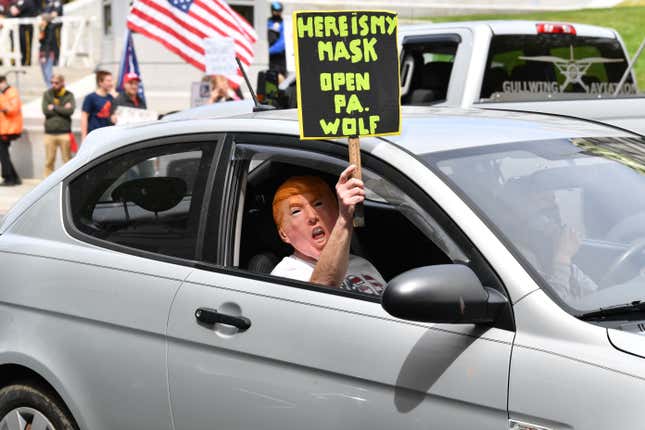
As part of their storied tradition of doing the absolute least when more is required of them, white people remain demographic outliers in their support of Donald Trump, according to a new NBC/Wall Street Journal poll that pits Trump against his presumptive Democratic rival, former Vice President Joe Biden.
According to the new poll, Biden maintains a sizable (and expected) lead among black American voters, leading 85 percent to Trump’s 7 percent. Self-identified Latinx voters also supported the former Barack Obama veep, at 60 percent to 26 percent.
But among all white voters, Trump still maintained an edge over Biden, with 51 percent of white voters giving their support to the president. Biden polled at 42 percent for white voters.
NBC analysts helped put some of these numbers in context, pointing out that Obama and Hillary Clinton actually polled more poorly with white voters during the 2012 and 2016 election (39 percent for 2012 Obama, and between 37 and 39 percent for Clinton in 2016). There was also a clear education split, particularly among white women: 64 percent of white women with a college degree supported Biden, as opposed to 37 percent of white women who didn’t go to college. There was a similar, albeit smaller, split among white male voters in the survey. Those with a college education voiced slightly more support for Biden (46 percent) than Trump (44 percent), but white men with lower levels of education showed a strong preference for Trump, at 65 percent.
This has been the pattern for the entirety of Trump’s presidency, though it’s all the more notable now for several reasons. If Americans are at all split about Trump’s handling of the coronavirus, that division is primarily among white Americans.
Coronavirus Impact on Voters
On the whole, Biden is polling lower now than Clinton did in the final exit polls for the 2016 election, in which she won the popular vote but still lost to Trump. Among verified voters in 2016, 66 percent of self-identified Hispanic voters and 91 percent of black voters supported Clinton.
But as NBC analysts note, Trump should actually be flying with a tailwind at this point: Historically, elected officials see a boost in their approval ratings when times are unstable, and incumbent presidents, in particular, tend to be viewed more favorably than their challengers when polled about their ability to handle crises. The fact that Biden edges Trump on this metric (at 47 percent vs Trump’s 38 percent) is actually a major anomaly.
The disproportionate impact of the coronavirus is also suggested in the numbers. A majority of respondents said they didn’t know anyone who had gotten the virus (59 percent), but more than three-quarters of participants said they worried a loved one would get it. With many places in the country not expected to see a peak in coronavirus cases for another couple weeks, this is a number we can only expect to see increase—especially if states choose to loosen stay-at-home restrictions too early.
Driven by these fears, 58 percent of those polled said they are more worried about stopping the spread of the virus than the economic fallout of shelter-in-place measures.
Here, the release doesn’t appear to differentiate respondents by race. But with early research showing great disparities in rates of sickness and death among black Americans and other communities of color (specifically, Latinx and indigenous populations), it’s safe to expect black voters will be more likely to know someone who has the virus than white voters.
This raises a few key follow-up considerations, especially when taking into account the optics of the anti-shutdown protests erupting in multiple states (there’s a whole lot of white in that red, white and blue). If black communities and other communities of color weren’t facing the most severe impacts of the coronavirus, would white people be more inclined to be critical of Trump’s handling of the crisis? To put it in even blunter terms: if white people were just as likely to die from COVID-19 as black people were, would 51 percent of them still support Trump?
Joe Biden Needs to Make Himself Heard
While the news appears mostly good for Biden—solid support among reliable Democratic voting blocs and greater confidence in handling a crisis—there are also some data points to be alarmed about.
Generation Z and Millennial voters hold a net-negative personal opinion of Biden, with just a quarter of young voters viewing him favorably (44 percent view him unfavorably). He’s still more popular than Trump—holding a 20-plus point advantage over his Republican opponent—but this really isn’t saying much among young voters.
And even though the voters polled in this survey say they prefer Biden’s leadership during a crisis, they don’t seem to be aware of what he’s been saying so far during this pandemic.
From NBC News:
When asked if they trust his statements about the coronavirus, a plurality of voters—42 percent—said they weren’t aware of his statements or didn’t have an opinion, while 26 percent said they trusted him and 29 percent didn’t. (By comparison, Trump is at 36 percent trust, 52 percent don’t trust, and 10 percent not aware/no opinion.)
This could be evidence that saying nothing is far preferable to the mixed messages and misinformation Trump has been putting out during his briefings, but it also establishes a clear directive for Biden—getting more visible, and more vocal, in the face of this pandemic.

